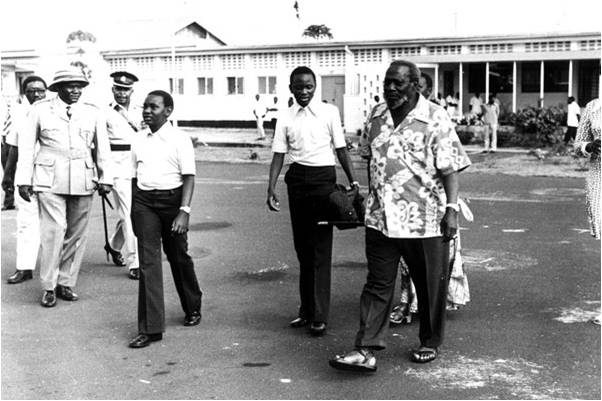JOMO KENYATTA
Kenyatta was an outstanding Kenyan politician who became Kenya's first president after independence.
He was born in 1894 at Ngenda village, Gatundu in Kikuyu land. His father died before Kenyatta was Six years old, but his mother soon was remarried but also died after a short time. In his early life, he was initially called Johnston Kamau Wa'Ngengi.
He received some little education from Church of Scotland Mission School around Nairobi. After his education, he was employed in Nairobi as an Inspector of water Supply. But shortly he went for further studies abroad. It was at this time that he got his name Kenyatta which s a nickname for Kenya's light.
He started building his political career in 1921 when he became Secretary General of the East Africa Association which was banned. He later joined the Kikuyu Central Association (KCA).
In 1928, he became a Secretary General of KCA. He also started publishing a Kikuyu language newspaper called "Muiguithania" (the Unifier) which tried to appeal to the Africans especially the Kikuyu to unite against the Europeans who had occupied the Kenya Highlands belonging to the Kikuyu.
He also stood to defend the land question to the Hilton commission, which was finding out the real problems of the Kikuyu.
In 1929 he was a member of the Kikuyu delegation to England, which wanted Kenyans to establish their own schools for better education. The same delegation also presented the issue of land. Colonialists had grabbed all the fertile land from the natives.
While in London he opposed the formation of the proposed East African federation, which was which was to combine Kenya, Uganda and Tanzania.

|
Figure 93: MZEE JOMO KENYATTA, ruled Kenya and led to its development until 1978 when he died in sleep. |
The Communists in Britain who hated imperialism supported him. They enabled Kenyatta to travel to Moscow, Berlin and Rome to get more ideas.
He joined Moscow University for a political Science course and later joined London School of Economics for specialized studies in Economics. In 1931, he wrote a Book called "Facing Mt. Kenya which was a detailed study of the Kikuyu customs and how the colonialist displaced their culture. During this time in Europe, he married an English lady, Edna Clarke as his third wife.
In 1932, Kenyatta forced the colonial government to offer compensation to the Kikuyu people whose land had been taken away especially in Kakamega.
He also published another pamphlet called "Kenya land of Conflict". In this pamphlet, he warned the whites of Kenya of revolution by the Kikuyu if they did not leave these occupied lands.
His contact with Soviet Union forced him to become a Communist. This is because the Communist opposed imperialism as an act of evil against humanity. Kenyatta got a lot of support eastern bloc.
It was also in this period that he and his colleagues Kwameh Nkrumah and George Padmore formed the Pan African Federation and organised the 5th Pan African Conference, which took place at Manchester in 1945. Over 200 outspoken members attended this conference from colonies in Africa and the Diaspora. They passed resolutions to work for independence.
In 1946 Kenyatta returned to Kenya to put the Manchester resolutions into action. He became president of the Kenya African Union in 1946.
Under his leadership, he modeled up the KAU Party and its members and numbers grew overwhelmingly so that his meeting could not be attended by less than 30,000 people.
He was appointed Principal of a Teacher Training College near Nairobi, but because of his growing popularity in politics, he was sacked from office by the colonial government.
The Maumau uprising sparked off in 1950 and the Colonial government blamed him. He was arrested, found guilty and was deported to a prison in Lodwar in extreme northern Kenya where he was supposed to serve 7 years' sentence.
After a serious campaign by the members of the Legico for Kenyatta's release, the colonial government released him in 1959 but restricted him to a small village (house arrest).
In 1960, KANU was formed and Kenyatta was elected president when he was in prison. Its Interim chairman J Gichuru refused to form government unless Kenyatta was fully out.
In 1962, Kenyatta was released to take part in London conference and negotiated constitutional terms leading to Kenya's independence.
He won the general elections held in May 1963. When independence was given on December 12, 1963 Kenya became Kenya's Prime minister and later President.
Because of the need to rule a united Kenya, Kenyatta declared Kenya a single party state. His Vice president Oginga Odinga later opposed this in 1966.
He participated in the formation of the East African Community together with his fellow presidents of the region.
He ruled Kenya and led to its development until 1978 when he died in sleep. His Vice President, Daniel Arap Moi, replaced him. One of late Kenyatta's prominent sons Uhuru Kenyatta was preferred by Moi as a suitable replacement for him after retirement in 2002 but the Kenyans did not vote for him for obvious reasons though he remains chairman of KANU party.
National Movements and New States in Africa